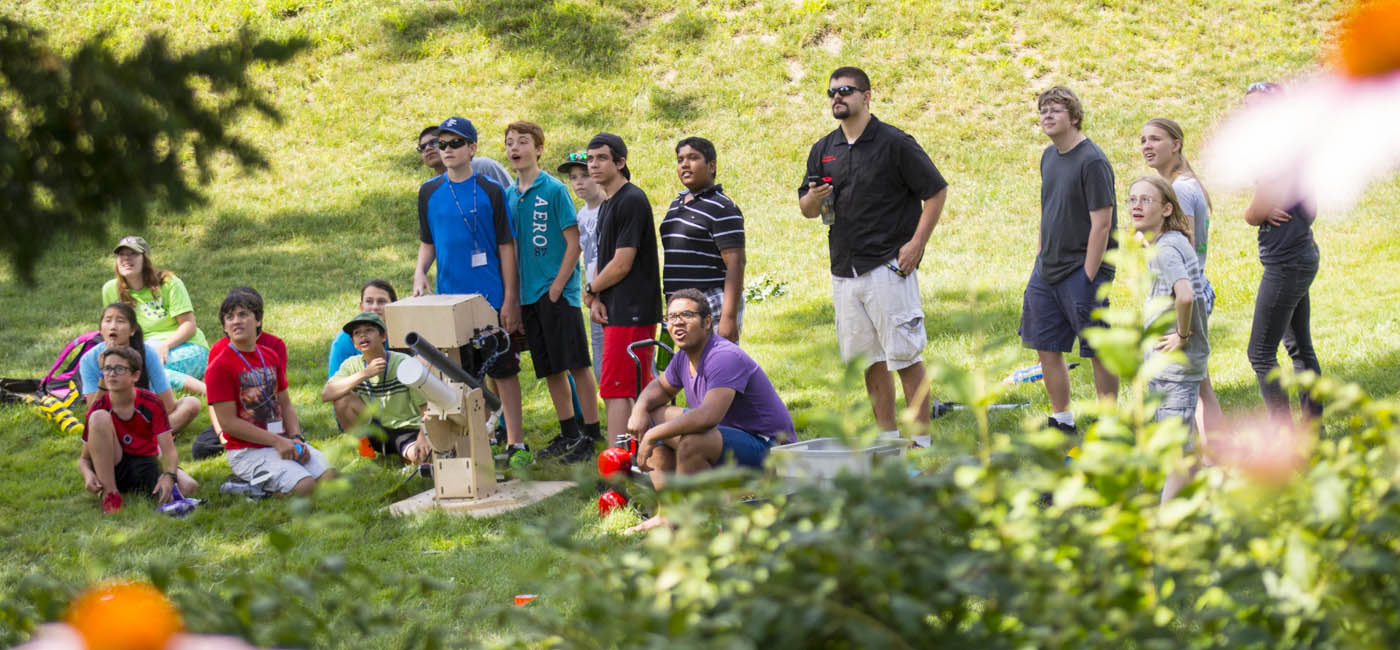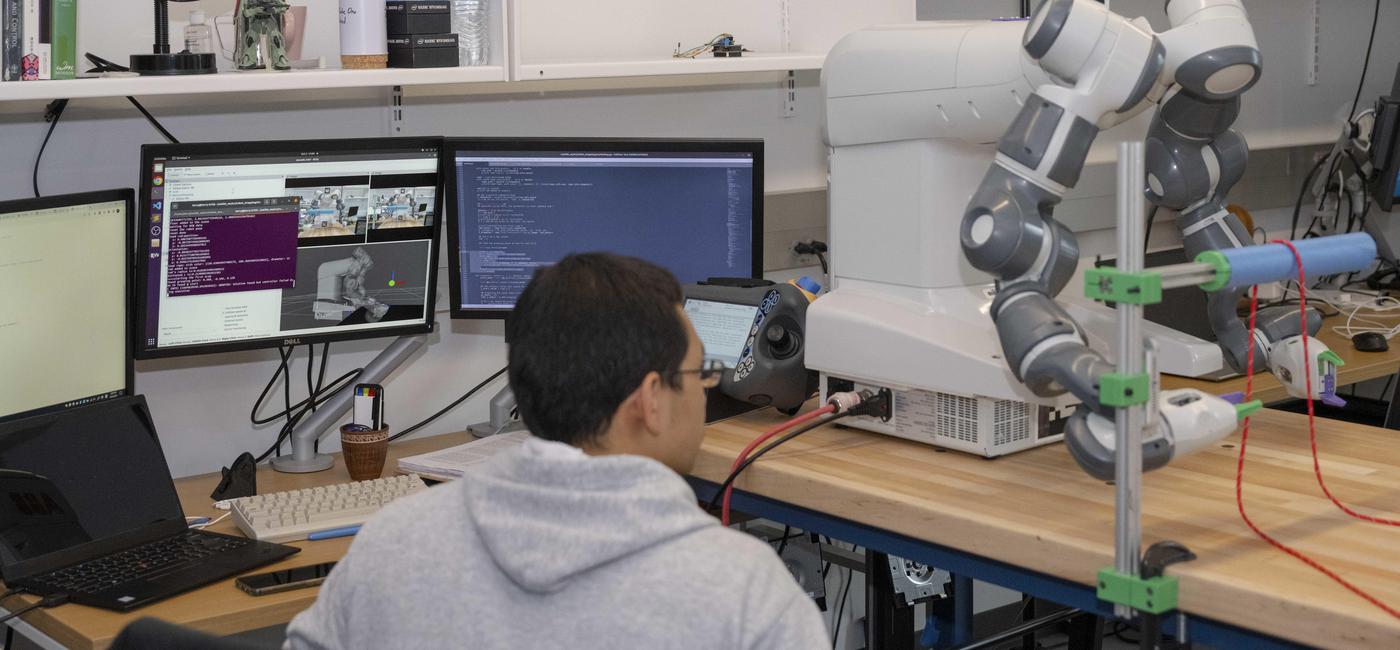By choosing WPI’s Master of Science in Computer Science, you immediately become part of our international reputation for innovative excellence, advancing the ever-growing computer science field, and working beside principal investigators in the labs and in collaboration with industry partners. Your work ventures outside of the ordinary at WPI, incorporating core CS competencies with research in areas like artificial intelligence, data mining, learning sciences, game development, mobile computing, and security.
Whether you choose the thesis or non-thesis option for your MS degree in computer science, you will emerge as a well-rounded, confident, socially aware, globally focused leader who is ready to solve real-world problems throughout your computer science career.

No matter what areas of the computer science field interest you most, you’ll find a supportive infrastructure and encouraging environment at WPI. Meaningful collaboration with other fields is a deeply held value here, and with our interdisciplinary curriculum for the Master of Science in Computer Science, you’ll be able to forge ahead in diverse areas like medical imaging, systems security, intelligent tutoring, health informatics, and data mining.
As you fulfill requirements for your MS in computer science, you have the flexibility to choose the right blend of courses to suit your interests and career goals, choosing from courses such as Advanced Systems Architecture, Multimedia Networking, Artificial Intelligence, and Biovisualization.
Learn more about WPI’s MS in Cybersecurity and Cybersecurity at WPI. A computer security specialization is available for this MS in computer science degree program.
Is the Master of Science in Computer Science the Right Degree for You?
If you’re looking for a similar degree but don’t have a computer science bachelor’s degree background (but you have earned a bachelor’s degree), WPI’s Master of Computer Science (MCS) is a good alternative to the Master of Science in Computer Science degree. The MCS is an applied degree for students who would like to gain additional computer science training for their professional roles, but don’t need the deep technical training the MS requires and don’t plan to seek a PhD path. The MCS offers a thorough computer science skill set that can be applied immediately in a professional setting and does not offer options for thesis work. Find out which degree is right for you.
Through his mobile health and sensing research, EPICC PI Emmanuel Agu is looking at the role mobile devices, smartphones, and health care apps can play in capturing important health data and biomarkers.
Computer Science: Career Outcomes
What does a career in Computer Science look like? Browse WPI and national data to learn more about companies who have hired WPI graduate, average salaries, job outlook, and more.
Our MS in computer science program gives students opportunities to conduct advanced research with our renowned faculty members in core research groups supported by agencies like the National Science Foundation, US Department of Education, and US Army, including the following:

At WPI, students venture deeply into the design, application, and ethics of cutting-edge technology.

At WPI, our approach means you’ll consider the additional social, ethical, and technological implications of your research and solutions so your work becomes more applicable and effective.

Areas of study at WPI are relevant in every area of industry, government, and academia, so our multidisciplinary and collaborative approach gives your research the potential to make an even greater impact in the world.

Building better cybersecurity tools, using smartphone apps to detect mental health changes, or using data to find previously unknown patterns—all things WPI computer science students do.

Our state-of-the-art facilities give students access to powerful supercomputers and to facilities that support research in computer security, artificial intelligence, database systems, human interaction in virtual environments, robotics, data mining, and more.
- Applied Logic and Security Group (ALAS)
- Artificial Intelligence Research Group (AIRG)
- Database Systems Research Group (DSRG)
- Human-Robot Interaction (HRI)
- Image Science Research Group (ISRG)
- Knowledge Discovery and Data Mining Research Group (KDDRG)
- Mobile Graphics Research Group (MGRG)
- Performance Evaluation of Distributed Systems (PEDS)
- Software Engineering Research Group (SERG)
- Theory Umbrella Group (THUG)
- Tutor Research Group (TRG)
Research Facilities
When you pursue a Master of Science in Computer Science, you’ll have access to our state-of-the-art research facilities offering the latest in computers and software. These resources, such as the Human-Robot Interaction (HRI) Lab and the Applied Logic and Security Lab, allow for creative and inspired exploration in areas like Internet privacy, next-generation user interfaces, and artificial intelligence.
Graduate Studies Series
Team members from Graduate & Professional Studies host quick and convenient webinars designed to highlight popular topics when starting grad school. Take a deep dive into specific areas of interest such as how to secure funding, how to ace your application, an overview of student services, and more!

Getting Involved As You Earn Your MS in Computer Science
WPI actively supports lots of ways for you to interact with other students and the campus community through clubs, organizations, and more. Some are even designed specifically for computer science MS students:
- Computer Science Graduate Student Organization (CS-GSO)
- Association for Computing Machinery (ACM)
- Women in Computer Science (WiCS)
Have questions?
WPI's dedicated graduate student support team can help.
Refer a Friend
Do you have a friend, colleague, or family member who might be interested in a WPI graduate program? Click below to tell them about our programs.
Earning a computer science MS opens the door to career opportunities in fields like game development, mobile computing, data mining, and many more. As the use of computers and computing devices becomes more pervasive around the world, talented computer scientists will become more in demand with the US Bureau of Labor Statistics predicting about 4.4 million jobs by 2024.
Faculty Profiles








Explore More Computer Science Graduate Programs
Maybe you're working in the field, but are looking to advance your career and gain new skills. Computer science field professionals appreciate the ease and flexibility of a concentrated program. WPI’s computer science graduate certificate gives you the information you’ll use right away in your computer science career. You'll take graduate-level courses in a specialized area of CS whether it be database design, AI, programming, or even software engineering. Are you already a step ahead and have a master's? Consider earning a PhD in computer science which enables students to dive into their own research areas. WPI has built an international reputation for research excellence over the past 40 years, giving students the access they need to world-class labs and industry software.
Need to Earn a Bachelor’s in Computer Science First?
Are you ready to start your path to a computer science career? Check out WPI’s BS in computer science which explores the connected world and global perspectives. If you’re looking for a background in the computer science field that will complement your major, try WPI’s minor in computer science. This will give you background on computing skills applicable to almost any field.


